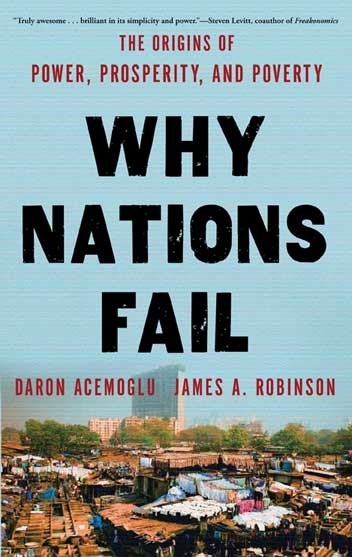Why Nations Fail by Daron Acemoglu and James A. Robinson
Chosen by: USAID Chief Economist Steven Radelet
Synopsis:
Why Nations Fail is a sweeping book aimed at answering one of the most critical questions facing the world today: why are some nations rich and others poor? Authors Daron Acemoglu and James A. Robinson argue that it is political and economic institutions that underlie economic success. More strongly, they argue that development differences across countries are exclusively due to differences in political and economic institutions, and reject other theories that attribute some of the differences to culture, weather, geography or lack of knowledge about the best policies and practices. Written for a non-technical audience, the book romps through several thousand years of human history by drawing on examples from the Roman Empire, the Mayan city-states, medieval Venice, the Soviet Union, the United States, countries in Africa, and China to build a new theory of the political economy of development. It also looks forward, asking whether China's rapid growth will continue, whether America's best days are behind it, and whether western aid organizations use the best approaches and ideas in helping reduce poverty.

Steve Radelet: If you like books that focus on the big questions of development and put today's development challenges in a broad historical context, you'll love Why Nations Fail. This is a very ambitious book written by two of the world's most respected academic development economists, and is a must-read for anyone interested in why some countries are rich and others poor.
The authors make a strong case for the importance of institutions - property rights, rule of law, a level playing field and strong incentives of investments in new technologies and skills - in explaining differences in development across countries. They further argue that bad institutions are the product of political systems that create private gains for elites in developing countries and impoverish the broader society along the way. Countries with "extractive" economic and political institutions remain impoverished, whereas those with "inclusive" institutions are able to achieve sustained income growth and lift people out of poverty.
There is much that is right about this argument. But the book falters by overreaching and by arguing that differences in development progress are due exclusively to institutions. It dismisses the view that bad ideas - whether they be cultural ideas such as that women should be subservient, or economic ideas such as massive central planning - lead to poverty , and argues that while these are important they ultimately are caused by differences in institutions. Sometimes the arguments seem to get a bit circular. The authors believe the geography does not matter, and that institutions explain all of the income differences between land-locked deserts like Chad and coastal city-states like Singapore - a view that makes little sense to me.
And they take a shot at institutions like USAID that provide technical and policy advice to developing countries, arguing that we are wasting our time because while elites in developing countries know the right thing to do, they choose to do otherwise for their own self-interests. There are undoubtedly many elites that fit that picture, and we all know. But those of us who work with capacity-constrained governments in low-income countries that do not have the expertise to analyze what has worked around the world will find this conclusion puzzling and at odds with our own experiences. We have all worked with senior officials that want to do the right thing, but do not know the options and want to learn more about best practices and experiences from successful countries.
This is a book that will make you think hard about why some countries are rich and others poor, what we do, why we do it, and how we can best contribute to developing country's efforts to fight poverty and achieve development success. Read it and let the debate begin.
Discussion Questions
- How do institutions create the incentives that lead to sustained development and poverty reduction?
- Do you think that institutions explain all of the differences in development across countries, or are some of these differences due to geography, culture, ideas or even just luck (good or bad)?
- The book argues that China has so far developed with extractive rather than inclusive institutions, and therefore China's rapid growth cannot continue and may even collapse. Do you agree?
- What are the implications of the arguments in this book for USAID and how we direct our assistance?
Get Involved: Use the comments section of this blog post to share your answers, or tweet them to us at #fallsemester








Comment
Make a general inquiry or suggest an improvement.